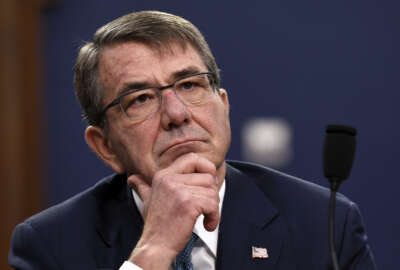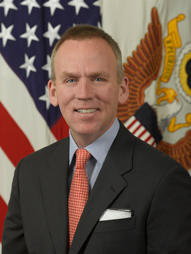
Carter proposes host of changes to military, civilian personnel rules
Secretary of Defense Ashton Carter announced sweeping changes to DoD's personnel system for both military officers and civilian employees, saying it needs more...
(This story will be updated)
The Defense Department announced sweeping changes to its personnel system for both military officers and civilian employees on Thursday, saying it needs more flexibility over military promotions and to hire and retain qualified civil servants.
Most of the changes to the military system would require Congress to change the Defense Officer Personnel Management Act (DOPMA), the 1980 law which dictates most aspects of the military promotion process. Defense Secretary Ashton Carter said DoD would seek four specific changes as part of his broader Force of the Future initiative, including a relaxation of the “up or out” promotion process, which he said is fundamentally sound, but too rigid.
Specifically, DoD wants the military services to be able to change the “lineal numbers” within each year group in their respective officer corps so that the timing of officers’ promotions to the next rank is based on performance and not necessarily because they’re next in line.
“[The current system] can lead to a particular promotion going to the most senior person on the list, even if someone else a bit lower down would be more effective in the job,” Carter said in a speech to Defense employees in the Pentagon’s center courtyard. “It also means that high-performing officers who get selected for promotion a year or two ahead of their peers often have to wait in line behind everyone else more senior — sometimes for a year or more — which prevents putting their talent to use as soon as it may be needed. And if they get fed up waiting and decide to leave the military for some other opportunity, that hurts us too. It’s counterproductive.”
Carter said DoD will also ask for a relaxation of the strict timelines that dictate how long an officer can stay in one rank before promotion to the next one. He said the current system unduly penalizes officers who decide to pursue higher education or “nontraditional” career paths. The proposed change would let the military services defer promotion boards for certain officers.
“Take Army Lt. Joseph Riley, for example, who was a Rhodes Scholar and the nation’s top ROTC cadet in 2013,” he said. “Because he spent two years at Oxford instead of holding the typical military jobs expected of the Army’s junior officers, the system almost didn’t promote him, and in fact was on track to separate him from the military entirely — that is, until [Army chief of staff Mark] Milley heard about it last fall and intervened, thankfully. We can’t have a system that inadvertently kicks out a Rhodes Scholar just because the calendar tells us to.”
The military services would have to decide exactly how to implement the authority Carter is asking for, but in general, individual military members would be able to temporarily “opt-out” of their next promotion board, effectively delaying the point at which the current DOPMA rules mandate that they either be promoted or leave the military. The hope is that those military members will use that time to check whatever boxes are necessary to make them competitive for promotion.
Also, DoD wants more authority to recruit private sector experts in certain specialized fields and commission them as officers at fairly high pay grades. The change would not apply to most of the military’s “generalist” line officer positions, but Carter said the department needs more lateral entry authorities for specialized, hard-to-fill career areas like cybersecurity and scientific positions. In those cases, most new officers would be minted as mid-grade officers, but the authority the department’s asking for would let it commission a new officer up to the rank of O-6 (a Captain in the Navy or a Colonel in the Army, Marine Corps or Air Force).
While many of those functions can be performed by civilians, DoD says it needs the ability to use uniformed personnel in some situations because of “the legal protections we afford our military personnel.”
“In those situations, when perhaps a network defense or encryption expert from a tech company feels a call to serve and is willing to contribute to our mission as a reservist or on active-duty, we need a way to harness their expertise and put it to use,” Carter said. “We may not be able to offer as much money as the private-sector, but we can offer one of the noblest of missions. We can offer the most intriguing of problems, and we should be able to offer a rank, status, and leadership position commensurate with their abilities.”
Carter said the department will ask Congress to make the changes to DOPMA on a permanent basis, not as temporary pilot programs so that its officers will be able to plan their careers with a degree of certainty. The department is also asking lawmakers for broad flexibilities that would allow the military services to temporarily waive any other provisions of the law when they decide that doing so is necessary to tackle short-term personnel problems.
For its civilian workforce, DoD will request new authorities to recruit directly from college campuses and make them tentative job offers, similar to procedures used by the intelligence community.
“Right now, if a DoD recruiter meets an undergrad student, a grad student, or a recent graduate who’s a perfect candidate for a particular job opening, they have to send them to the USAJobs website,” Carter said. “It can take 90 days — and that’s if everything’s moving at lightspeed. And that’s not even counting the time it takes for a security clearance. Some people are able and willing to wait that long, and we’re lucky for that. But in today’s job market, if you’re a computer science or other STEM major graduating from Stanford or MIT or the University of Texas, you’re not going to wait three more months after you applied for us to make you an offer.”
In fact, even the 90 day figure is an aspiration, not yet a reality. Defense officials said the current wait to process a new civilian hire through USAJobs channels is about 160 days on average.
Carter said the department would also ask Congress to extend paid maternity leave to the civilian workforce, a benefit already available to military personnel.
Finally, the department wants to create a new “talent exchange” to allow its civilians to more readily move back and forth between DoD and private sector jobs.
“Right now we have very few such programs, with very limited scope,” Carter said. If we want to send a civilian from the Defense Logistics Agency or U.S. Transportation Command to spend 6 months at a place like Amazon or FedEx to see what we might be able to learn, there’s no formal mechanism for that. The same is true in the opposite direction if we want to host people from those or other companies. Being able to temporarily exchange civilian employees, talent, and best practices with some of America’s best and most innovative companies will help DoD stay on cutting edge and be more efficient and effective.”
The civilian personnel reforms Carter finally settled on are much less ambitious than the ones advanced in a set of draft recommendations by Brad Carson, the former acting undersecretary of Defense for personnel and readiness who served as Carter’s point person for Force of the Future.
Carson, for instance, advocated moving the entire Defense civilian workforce out of the Title 5 structure that’s overseen by the Office of Personnel Management and creating a new personnel system within Title 10, arguing that the Defense secretary can’t effectively manage the workforce under a “personnel system that is outdated, rigid and representative of a workforce demographic from more than 60 years ago.”
But the recommendations led to an outcry from federal employee unions, and Carter ultimately decided to seek reforms that worked within the Title 5 structure used by most other federal agencies (with the exception of the intelligence community) instead of seeking to abandon it altogether.
“Brad cast a very wide net and I think he did an excellent job of bringing in a very diverse set of ideas,” said one senior Defense official who discussed Thursday’s proposals with reporters on the condition of anonymity. “But this was one of the proposals that we didn’t include. Part of the reason is that there are some important functions that Title 5 serves, and the department has already been through the experience of trying to throw Title 5 in the trash bin when we went through the National Security Personnel System experience. What we discovered is we end up fighting years of political battles and trying to replicate a lot of the protections Title 5 already includes so that we can assure people that we intend to treat them fairly. If you simply say ‘there are no rules,’ you don’t have that assurance. I think the direct hire authority is a great example of where we can work within the current system.”
The same official said that while Carter retains the right to announce more personnel reforms for as long as he’s Defense secretary, the initiatives he announced Thursday are likely the last large package he’ll propose as part of Force of the Future, partially because there’s no time left for Congress to act on other initiatives before the next president takes office.
The Senate’s version of the 2017 Defense authorization bill already includes two of the measures Carter is proposing — the ones dealing with lineal renumbering of military officers and lateral accessions from the private sector.
Their inclusion in the Senate version of the bill was accomplished, in part, through talks between members and staffers on the Senate Armed Services Committee and Peter Levine, who has been the acting undersecretary of Defense for personnel and readiness since April 2016.
Levine was the Senate Armed Services Committee’s staff director until April 2015, when he was confirmed as DoD’s deputy chief management officer.
Copyright © 2025 Federal News Network. All rights reserved. This website is not intended for users located within the European Economic Area.
Jared Serbu is deputy editor of Federal News Network and reports on the Defense Department’s contracting, legislative, workforce and IT issues.
Follow @jserbuWFED





